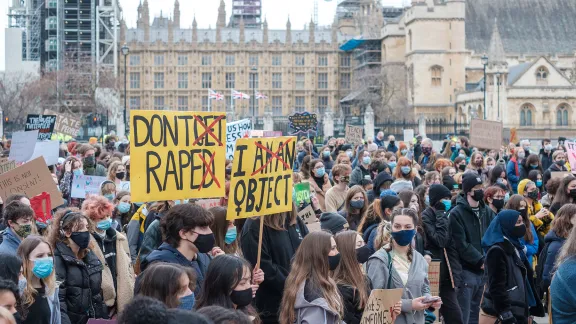
Photo: Ehimetalor Akhere Unuabona/Unsplash
LWF and partner faith-based organizations prepare trainees to lead regional capacity building
(LWI) – Nearly 60 delegates from faith-based organizations around the world are meeting online for the annual training on advocacy for women’s human rights, 7-9 September, this time focusing on strengthening networking and collaboration at the local and regional levels.
The Lutheran World Federation (LWF) is one of seven organizations that have been partnering in the joint venture since 2015, with the goal to enhance the capacity of faith-based organizations as gender justice advocates. Gathering lessons learned from the last six years, the Women’s Human Rights Advocacy Training of Trainers (ToT) will also design a training program for a regional pilot project in Africa in October.
Participants in the ToT include representatives from LWF member churches and country programs, and from co-host organizations ACT Alliance, Act Church of Sweden, Finn Church Aid, Mission 21, Norwegian Church Aid and the World Council of Churches.
“The training advances LWF’s commitment to work with our ecumenical and interfaith partners to strengthen advocacy towards ending gender-based inequality and other intersecting forms of discrimination. The COVID-19 pandemic has made it clearer that more concerted effort is imperative,” said Ms Sikhonzile Ndlovu, LWF Advocacy Officer for Gender Justice.
The training advances LWF’s commitment to work with our ecumenical partners to strengthen advocacy toward ending gender-based inequality and other intersecting forms of discrimination. The COVID –19 pandemic has made it clearer that more concerted effort is imperative.
Ndlovu noted the COVID –19 pandemic has exacerbated existing disparities including sexual and gender-based violence, reversing gains made in gender equality in the last 25 years since the United Nations (UN) Beijing Declaration urging governments to ensure equal rights and opportunities particularly for women and girls. "The rise in religious fundamentalisms and increased pushback on human rights calls for increased advocacy especially at national level where civil society advocates can make an input,” she added.
Participants at this year’s gathering are working in the field of human rights and gender justice and as such are familiar with UN mechanisms including gender justice tools and processes such as the Convention on the Elimination of All Forms of Discrimination against Women (CEDAW) and the Universal Periodic Review (UPR), which will be featured at the training. Topics being discussed include how to design and facilitate a regional training, instruments on gender justice advocacy, how to report on human rights in different contexts and the role of faith-based organizations in gender justice advocacy. Other subjects include how to counter backlashes and address challenges, human rights’ language, gender-based violence in the context of COVID-19 as well as safety and security relating to advocacy on women’s human rights.
As the current meeting is the first step toward localizing the women’s human rights advocacy training program, participants from Africa will jointly design their regional training which is scheduled to take place, 11-18 October.
By LWF/P. Mumia


